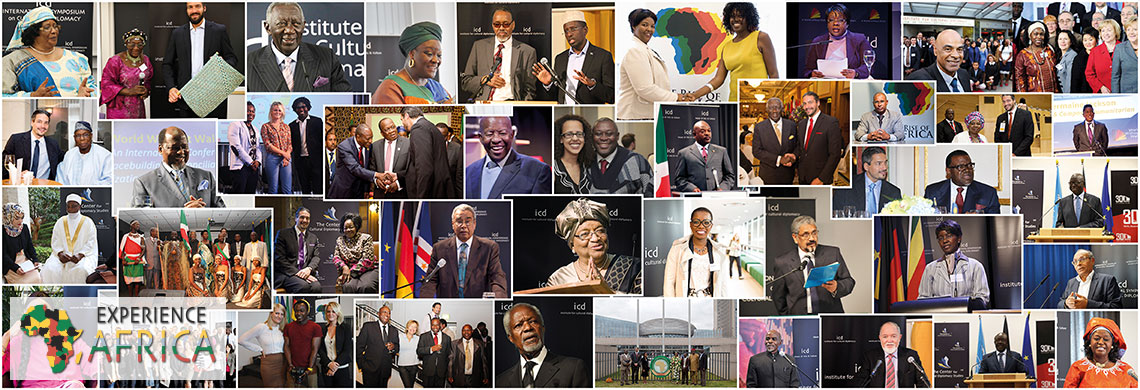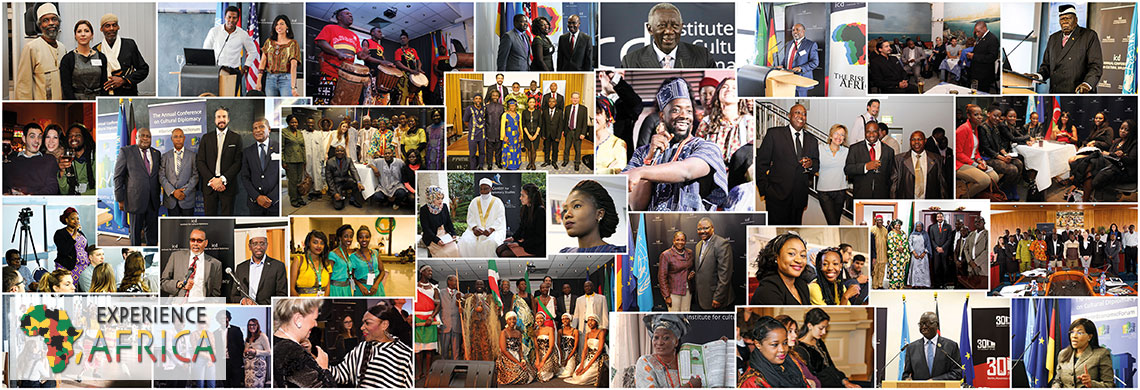The Berlin Annual African Film & Media Festival 2013
"Africa on Screen: Through the Eyes of Africa"

History of African Film Industry
An Introduction
The rise of the African film industry can be traced back to the decolonization period of the continent. Despite the prior existence of such an industry under foreign rule, the African film industry did not reflect an accurate portrayal of the cultures it was intending to represent. Instead, the film industry was permeated by stereotypes and Africa was utilized merely as an “exotic” background for Western cinema. However, this underwent a significant change during the 1960s, when numerous African countries obtained their independence. This is especially true of the former French colonies, whose local filmmakers received technical and financial support from the French Ministry of Cooperation.Spearheaded by individuals such as François Mitterand, efforts to encourage the integration of African film production as a part of the cultural, political and economic development of the continent were further strengthened in the 1980s. Also, as the vast majority of films made before the countries´ decolonization were explicitly racist, many African directors who gained prominence post-independence, such as Ousmane Sembene and Oumarou Ganda, used the art of filmmaking as a political instrument in order to rightly restore their image which had been wrongly depicted by Westerners. Thus, African cinema came to strongly feature social and political themes and the neocolonial condition.
However, Africa is a vast continent and its countries and cultures have their own specific cultural, political and geographical backgrounds and elements that are uniquely expressed in a myriad of manners in their films.
Examples of Film Industries in Africa
To illustrate the rich variety among the African film industry, it is worth looking at a few examples.South Africa
South-Africa, for instance, established itself as the financial and technological “super-power” of Africa in the final years of the 1990s (which marked the end of Apartheid rule), having overcome prior restrictions imposed on international access and production. Also, the first African film to win an Academy Award for Foreign Language Film was Tsotsi (2006), a South-African production.Nigeria
Another African nation that is boasting a rapidly growing international cinematic industry is Nigeria. ´Nollywood´s´ expansion is seeing the production of over 1000 films per year, albeit low-budgeted productions. This is reflected in the fact that the average cost of a Nollywood film is between $25.000 and $70.000, whereas the average cost of a Hollywood movie is $250mn. These films are generally geared towards the lower classes and poorer communities more than towards an international audience. This thriving industry holds much promise for the African film industry which is witnessing attempts to achieve greater autonomy from Western financial support. The Nigerian film industry is indisputably diversifying its economy by creating jobs in a country that depends principally on oil and agriculture. The Nigerian film industry is known to be the most popular on the African continent. The estimated annual revenue of Nollywood is $590mn.Egypt
The cinema of Egypt is part of the Arabic-spoken film industry, and is annually animated by the Cairo International Film Festival. Since 1896, more than 4000 films have been produced in Egypt, which accounts for three quarters of the global Arab film production. Egypt occupies the position of one the biggest film producers of the Middle East.Burkina Faso
The cinema of Burkina Faso has an important role to play in the post-colonial West African industry, with the creation of the film festival FESPACO in 1969. Many of Burkinabe filmmakers are internationally recognized and have won international prizes. Today, many private production companies are flourishing (over 25 by 2002), with numbers expected to rise steadily.Kenya
In the case of Kenya, the film industry is still relatively modest, and rather than fictional movies, Kenya mostly focuses on documentary films about the poor living conditions of the people in its cities. However, the country lacks the financial means required to produce wider scale films and pay professional actors. In response, the Kenyan government has made a strong effort to enable the Kenyan cinema to become an established and prosperous industry, with the creation of the Kenyan Film Commission in 2006 (under the Ministry of Information and Communication), whose goal it is to raise international awareness about its developing industry with the aim of attracting potential investors. In addition, Nairobi now houses the Hot Sun Foundation, an organization dedicated to the discovery and cultivation of new young talent in poor areas which lack access to education and professional acting training. The internationally renowned film ´Out of Africa´ (1985), portraying Kenya´s colonial history, demonstrates the vast potential of the Kenyan film industry. In addition, the movie ´Nairobi Half Life´ (2012) was nominated for the Best Foreign Language Film.Algeria
In Algeria, during the era of French colonization, movies were predominately a propaganda instrument for the French colonial state. However, European domination of the means of cinematic production ended in the early days of the Algerian War, when several Algerian nationalists from the National Liberation Army (ALN) obtained basic film-making equipment which they used to create four short programs. Along with decolonization and the Algerian War, the plight of urban youth is another common theme.Morocco
In Morocco, cinema forms a considerable part of the economy as many foreign movies are shot in the beautiful landscapes of the country, such as in the Ouarzazate area. Furthermore, the country holds many festivals and events alike in the cinematographic industry. In 1944, the Moroccan Cinematographic Center (CCM), the nation's film regulatory organization, was established. Studios were also opened in Rabat. In 2001, the first International Film Festival of Marrakech (FIFM) was held in Marrakech.Somalia
In Somalia, the earliest forms of public film display in the country were Italian film-documentaries of key events during the colonial period. The first few Somali films and cinematic festivals emerged in the early 1960s, immediately after independence. Following the creation of the Somali Film Agency (SFA) regulatory body in 1975, the local film scene began to expand rapidly. In the 1990s and 2000s, a new wave of more entertainment-oriented movies emerged. Referred to as Somaliwood, this neophyte, youth-based cinematic movement has given great momentum to the Somali film industry and contributes to the introduction of innovative storylines, marketing strategies and production techniques.Evidently, each country is pursuing its own strategy at a different pace in order to establish its film industry on the world stage. Discussed above are just a few instances which exemplify the overall increased efforts of the development of the continental film industry.
The Potential of the African Film Industry
The African cinema industry acknowledges undeniably the need to develop its own way of making films, support their local initiatives, and invest in cinematic cultures such as films festivals. Although the African film industry does not currently attract the same levels of popularity claimed by the well-developed European and American industries, it has shown significant growth and progress in the beginning of the 21st century, a fact reflected in part by the creation of a Journal of African Cinema and African TV channels.Such mediums act as awareness raising mechanisms and promote the diffusion of films, allowing the African film industry to attract genuine interest from the international community. The media and entertainment industries are registering above average growth in many African countries and are expected to grow at 5% GDP per capita up until 2015. Many countries such as Nigeria, Kenya and South Africa offer the great opportunities for content producers and distribution platforms for film, television, digital media, mobile and other forms of entertainment.
Urbanization, young demographics, and the expanding and emerging middle-class are the success drivers for the industry and are likely to contribute to its rapid growth in the future. Perhaps one of Africa´s greatest assets is its highly diverse cultural, historical and social composition. An ever-growing film industry, encouraged by increased investments and the abolition of censorship, will further add impetus to an already booming sector by allowing creative minds to harness this cultural capital. Furthermore, an expanded film industry translates into a flourishing labor market, providing new opportunities for young talent and thus helping to combat the global contemporary phenomenon of youth unemployment.
Thus, in the long term, investments in the film industry of Africa will aid African countries in their quest for the universal goal of sustainable development.


















































